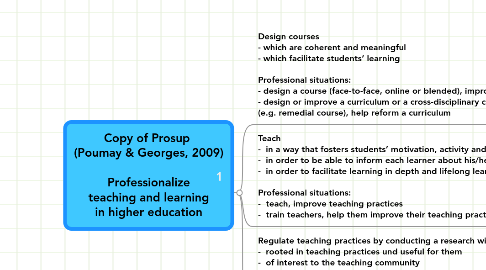
1. 1
1.1. Design courses - which are coherent and meaningful - which facilitate students’ learning Professional situations: - design a course (face-to-face, online or blended), improve it - design or improve a curriculum or a cross-disciplinary course (e.g. remedial course), help reform a curriculum
1.1.1. Thinking skills
1.1.1.1. Know about the main development processes of students’self-awareness, learning, motivation and self-regulation (general and domain-specific teaching skills)
1.1.1.2. Know about competencies and learning objectives and about the main characteristics and classification methods (taxonomies) of both notions
1.1.1.3. Know about the main teaching and learning methods and about the specific relevance of each to teaching and learning
1.1.1.4. Know about the main criteria for assessing and evaluating (including formative assessment)
1.1.1.5. Know about the main qualities ideally pertaining to a course (meaningfulness; congruent objectives/competencies, methods and assessments; learner-centered teaching and active learning)
1.1.2. Practical skills
1.1.2.1. Present the course plan (or syllabus) in order to facilitate learning
1.1.2.2. Select competencies to be developed within the course together with the related resources, bearing in mind the goals of the curriculum, the links between courses and the learners’ needs
1.1.2.3. Design activities that enable learners to mobilize and to combine the resources pertaining to the competencies to be developed; the design of activities may draw from already existent materials; the activities have to take individual differences into account (diversity, preferences, background)
1.1.2.4. Design assessments that inform about the mastering level of the competencies to be developed and about the way resources have been mobilized and combined
1.1.2.5. Technology enhanced teaching has to go hand-in-hand with technology related skillfulness and a concern in technological opportunities for facilitating student learning
1.1.3. Attitudes
1.1.3.1. Be aware of fairness while designing and planning a course, its learning activities and assessments
1.1.3.2. Partake in a pluridisciplinary team while sharing the collective responsibility for the curriculum
1.1.3.3. Be self-critical especially in relation to facilitating students’ learning and development
1.2. Teach - in a way that fosters students’ motivation, activity and engagement - in order to be able to inform each learner about his/her progress - in order to facilitate learning in depth and lifelong learning Professional situations: - teach, improve teaching practices - train teachers, help them improve their teaching practices
1.2.1. Thinking skills
1.2.1.1. Know about the various factors that may influence teaching actions, especially in relation to students’ engagement in mastery-oriented learning
1.2.1.2. Know about the various services available to students within the institution
1.2.2. Practical skills
1.2.2.1. Prepare a course in order to promote interactions in support of learning and of intrinsic motivation
1.2.2.2. Assist students in self-regulating their learning and in building an environment suitable for learning (class, curriculum, institution)
1.2.2.3. Assist each student in his/her theoretical and practical learning and in conducting his/her professional project
1.2.2.4. Assess learning outcomes by taking individual engagement and progress into account; assess learning outcomes in order to promote self-efficacy and to provide information useful for decision making
1.2.2.5. Arrange timing in order to meet the goals that have been set (bearing in mind interpersonal differences) and deal appropriately with critical incidents
1.2.3. Attitudes
1.2.3.1. Create a learning environment that promotes mutual respect, cooperation, enthusiasm, engagement, fairness
1.2.3.2. Listen to students and communicate with them (including the use of feedback) in order to facilitate learning and mutual comprehension
1.2.3.3. Be aware of ethics and deontology in relation to problems beyond institutional jurisdiction
1.2.3.4. Cooperate efficiently with colleagues, educational partners and (if need be) parents
1.2.3.5. Participate actively in institutional organization and development
1.3. Regulate teaching practices by conducting a research with the following characteristics: - well-documented - rooted in teaching practices und useful for them - of interest to the teaching community Professional situations: - conduct a research in higher education; enrich this field of knowledge and practice (conferences) - assist, train and advise teachers in matters related to higher education and classroom research - evaluate courses or curricula (accreditation)
1.3.1. Thinking skills
1.3.1.1. Know about the various types (currents) of research in the field of education sciences
1.3.1.2. Know about the various data and about the various statistical treatments of data
1.3.1.3. Know about the ways of regulating learning and practices of classroom research
1.3.2. Practical skills
1.3.2.1. Pose significant questions that deal with learning; investigation should be centered on the selected questions
1.3.2.2. Use research methods and tools that permit investigation of the selected questions
1.3.2.3. Process investigation data (both subjective and objective) according to the methodological rules
1.3.2.4. Propose results and perspectives that lead up to further meaningful research
1.3.2.5. Inform honestly about the conducted research at meetings, conferences and in scientific papers
1.3.3. Attitudes
1.3.3.1. Demonstrate intellectual curiosity, interest in learning and criticism in relation to knowledge
1.3.3.2. Be open to change and innovation in support of students’ learning and development
1.3.3.3. Demonstrate rigour and scientific honesty
1.3.3.4. Reflect while and on acting in order to constantly improve teaching practices
